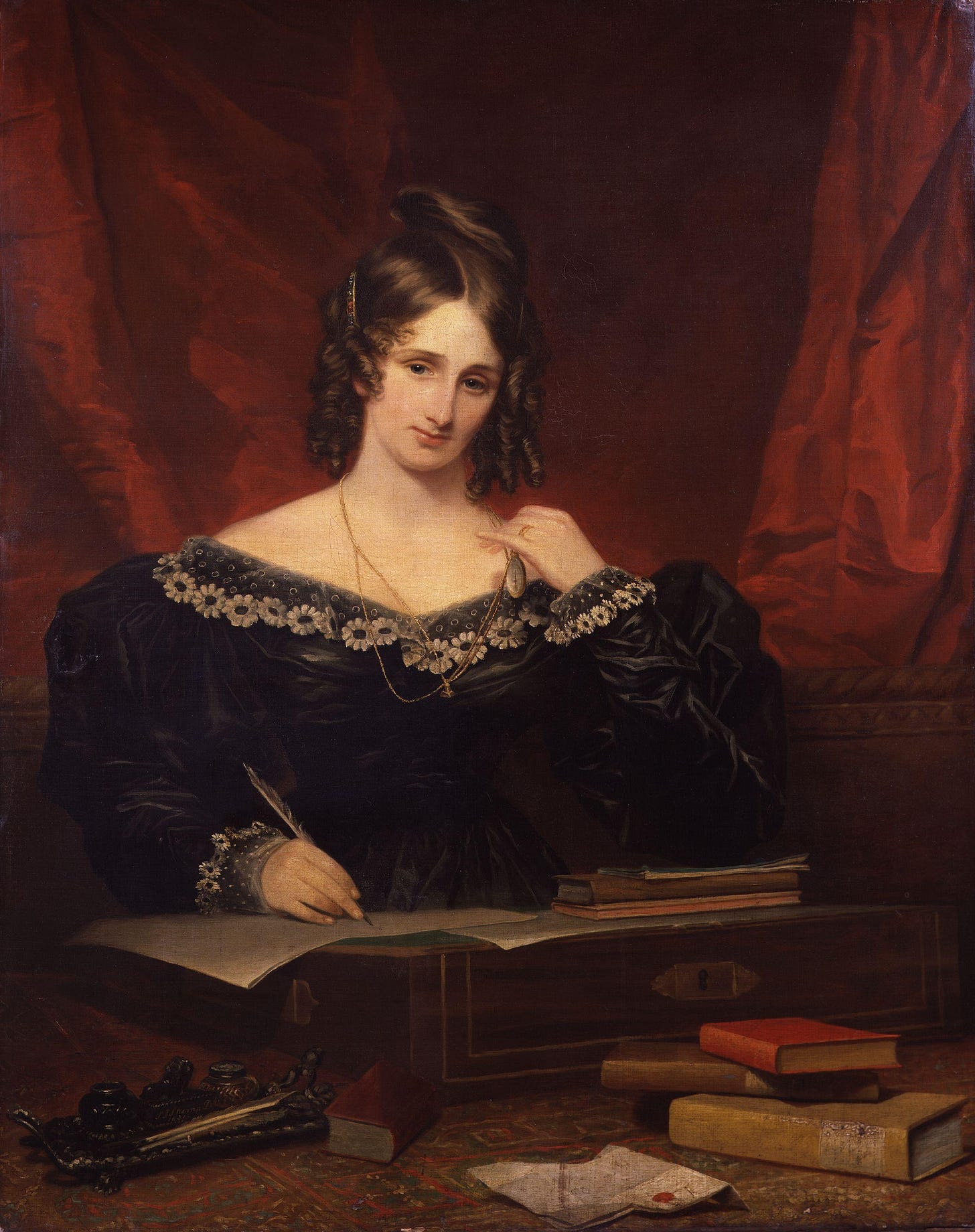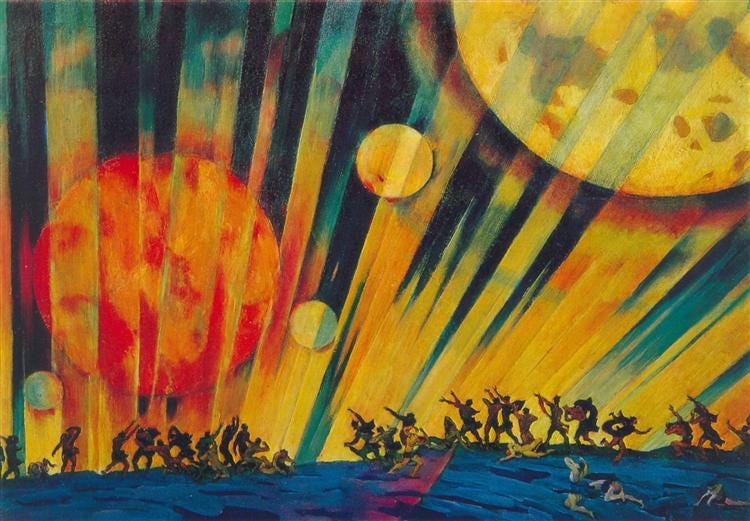Thank you to Jesse for asking the question that made me want to think this through.
I do have to say that I am quite enjoying the reading for Revolution and Ruin, our book group. It was a treat to get to revisit The Last Man, Mary Shelley’s prophetic vision of the end of humanity (but not, crucially, the end of the world). I had not read it in ages, and the first time I did I spent the first two hundred pages or so frustrated, like, when do people start dropping dead?
But The Last Man resists giving the reader what they want. It’s a very strange novel, changing somewhat every reading. It holds back from offering gleeful spectacle or maudlin anthropocene awareness campaigning. Even as it documents mankind at our most irrational and destructive, the novel also takes stock of the heights of the human project and all the grand things people have accomplished — which includes architecture “whose harmony of form is to the eye as musical concord to the ear!” but also sitting in a room with the people you love and spending time with them. It finds balance between intellect and heart, as Shelley is as invested in her characters’ relationships to power as their emotional attachments.
So why does Rebecca Solnit spend so much of her introduction to the new Penguin Classics edition (reprinted in Lithub) feeling sorry for Mary Shelley? She writes, “As a man, she would have cut a swathe through nineteenth-century English intellectual life and paid no price for living with her future spouse before marriage. As a woman she was cut down to nothing again and again.” I mean, this isn’t even factually accurate that men could just set themselves up domestically in any way they pleased without suffering social condemnation. (Please, Rebecca Solnit, maybe read a biography of Mary Shelley’s husband Percy????) But it’s bizarre to describe Mary Shelley, a celebrated writer and author of timeless books, as “cut down to nothing,” or to attribute all of her difficulties to her gender, ignoring issues of class, location, and having Pluto on her midheaven.
It’s boring to complain about these types of essays, which are there to draw interest to an older work that contemporary readers might find intimidating by associating it with someone approachable and familiar. They are often written on the fly, for not much money, and as is typical for these things there is no evidence Solnit actually read the book she is introducing. (Also poor Solnit is not exactly a towering intellect. I remember the insult a friend — herself terrifyingly smart — laid upon Solnit when we were discussing some not very good essay that had gone viral: “poor Rebecca fails to think yet again.”) One would hope for a little more insight into Shelley’s work than can be found in the movie version of her life as portrayed by Elle Fanning, but alas, they are pretty much on the same level.
But it is indicative of a certain way of thinking about (or failing to think about) women of the past: as objects of pity. Even if it’s borne out of sincere sentiment and a desire for bettering the lives of women, I have no doubt that grabbing Shelley from the past and placing her in today’s “liberated” context would do little to improve her life or facilitate her literary flourishing. What, so she can compete for diminishing print space with easy-listening writers like Rebecca Solnit, have her works be drowned out by werewolf and fairy erotica, go on a speaking circuit to address the narcissistically philanthropic? “Hi, I’m Mary Shelley and don’t forget to subscribe to my channel.” Please.
Like all the essays about “rediscovered” and “overlooked” women writers, artists, and composers that spend their time mourning what could have been rather than looking at what actually happened, Solnit misunderstands Shelley’s life and work. I’ve hammered on (and on) about the way Hilma af Klint’s work has been misrepresented and disrespected and poorly contextualized in the name of celebrating her. But other women get similar treatment, like Joan Vollmer Burroughs (wife of William) or Lucia Berlin. Writing about literature, writing about art, is fucking hard. Easier to project your fears of being unappreciated and uncelebrated onto people who are dead and cannot protest the forced association.
Also this approach, the “isn’t it sad that this talented woman didn’t get everything she wanted? that the world didn’t adapt itself to her genius so she could give us more work” is silly fantasy, but it’s also basically how “feminism” in the 21st century works. It declares certain women great, and suggests that the world reorder itself so they can realize their ambitions. It doesn’t matter if they are politicians who commit war crimes or wealthy women deemed thought leaders by mass media despite having opinions instead of thoughts. We must make sure they live unimpeded by criticism, obstacle, or hardship.
(And I’ve noticed a strange brittleness to our creative class, who are indoctrinated in this belief that they are one of the special ones and as such they should never have to be disappointed so they can produce works of celebrated greatness. They are resentful and sullen, trapped in grievance, unable to produce anything of note because their only motivation is the glorification of their own selves. The fact that a lot of these people work for major publications makes this particularly strange. What else do you need, bro?)
Shelley’s life was difficult, but a lot of that seemed to come down to economic hardship, lack of antibiotics, and being married to a goddamn slut. Not every bad thing that happened to her can be attributed to her gender, and I think that’s a weird way to live your life, thinking things like that about your own trajectory. I found myself giving up on Romantic Outlaws, a biography of both Shelley and her mother Mary Wollstonecraft when it became clear Charlotte Gordon was going to treat the women more like lifestyle gurus than philosophers. They were “inventing new ways to live” I guess but I think they were doing some other things, too. But also everything came down to the limitations imposed upon them by their gender, and the alternatives they would have had had they been men, when I’m sure given how complicated their existences were there were some other contributing factors.
Of course, oppression is real, but I think it’s a strange thing that oppression narratives are so popular with today’s women to the point that we want to hear more about what was suffered rather than how an individual adapted to the conditions of their time. If you’re oppressed, there’s no real need to take accountability for your position in life. Every setback is imposed upon you, rather than of your making. There’s no free will, only prejudice and discrimination thwarting you at every turn. These historical figures become sites of wild projection, where the goal is not moving toward understanding their experiences of hardship and adaptability but forcing on them your own feelings of helplessness.
Anyway, it’s 2025 and we are no longer accepting “this poor woman didn’t get everything she ever wanted isn’t that sad :(” pitches for cultural coverage. These essays only reveal things about the person who writes them — there is no need for the dead to be involved at all.
Recommended:
I tend to avoid Penguin Classics these days — the quality of the printing is not good anymore, and the introductions tend to be lacking in substance. I usually go for Oxford World’s Classics — the intros are boring as hell, but at least someone read the books.
What a relief to read about a woman artist — in this case Hildegard of Bingen — that centers the work and takes it seriously!
I have been reading some really weird op-eds and essays about how the Republicans might be able to revitalize art, because it’s wokeness that ruined everything. Sure, man! I appreciated Michael Rushton’s response to this idea.
Still obsessed with Andrea Pichl, especially her drawings of Stasi headquarters.
Join our Revolution and Ruin book group! We will be talking about things other than Mary Shelley’s gendered troubles!
Announcing Revolution and Ruin
·In the first volume of Mary Shelley's The Last Man, the characters are deeply engaged with the question of How to Live. It's a time of political tumult and change, with the monarchy toppled and a deb…








To me, the point of an introduction to a work of literature (especially one that is 199 years old) should be to highlight and contextualize its alien qualities. I think it’s hard to frame anything about The Last Man as contemporary. One of the things I loved about it, both from world it was created in, and the world Shelley created within it, is that it was like this missive from a dying culture. I want to call its underlying spirit a kind of optimistic pessimism. Everything is heightened because it will probably be gone soon. I read in, I think, I don’t have the copy with me right now, the introduction to the Oxford edition, that she wrote it in the wake of a volcanic eruption and a cholera outbreak. The scenario she was laying out within the novel was much more plausible. Compare that to the fiction of the 21st century, which I would say is pessimistic optimism. We have a sense that the world drags on, specialists find cures, we’ll be ok, but because of that, a lot of what we experience just kind of softly, consistently, sucks.
It’s a nitpicky thing I know, but Rebecca Solnit says “The Last Man was coyly credited to ‘the author of Frankenstein’”. But wasn’t that the usual? Thomas Hardy’s first novel, Desperate Remedies, was published anonymously, and his second, Under the Greenwood Tree, was credited to “the author of Desperate Remedies.” It’s not until his third novel we see his name on the title page.